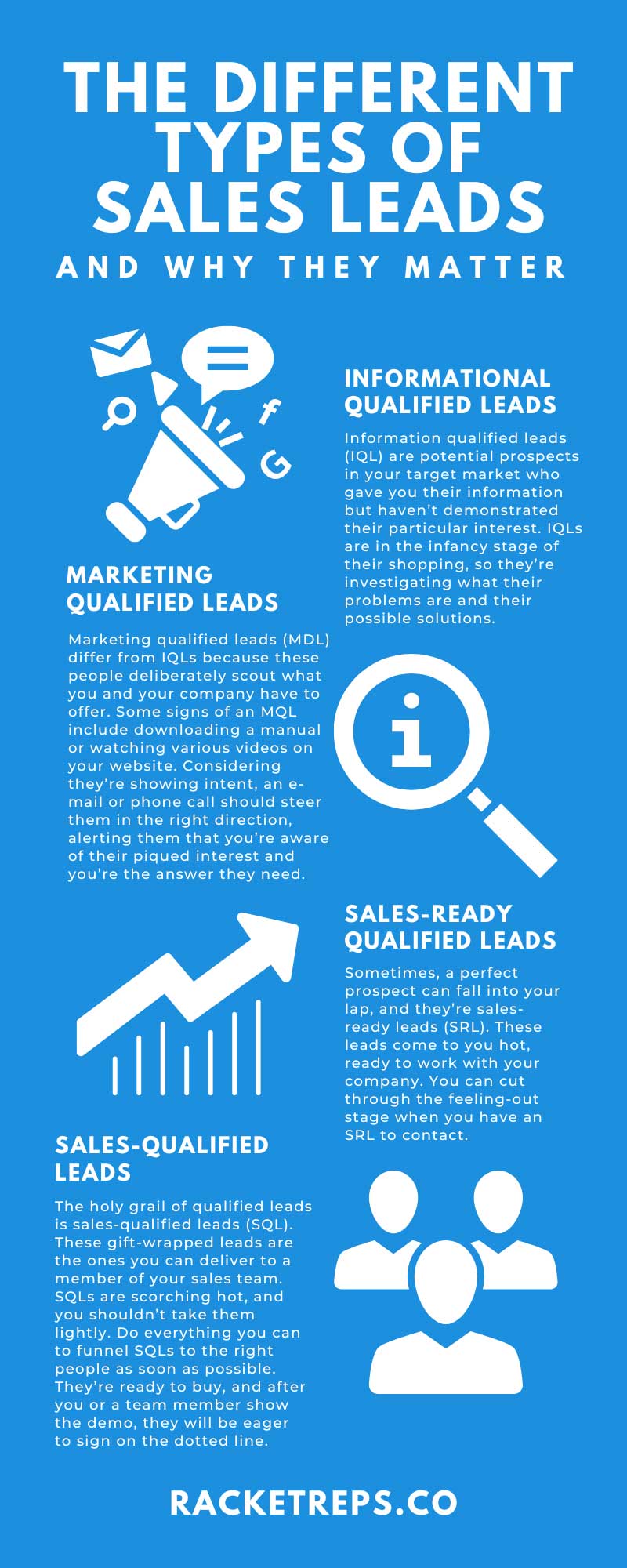The Different Types of Sales Leads and Why They Matter
A sales lead is someone or something that fits your customer profile to a tee while showing their potential interest. But not all leads are the same, nor are the methods of acquiring them. Understanding the different types of sales leads and why they matter is vital to take things to new heights.
Cold as Ice
During the off-season, every sports fan looks at their team to determine what players are a perfect fit for them the following year. The same thing happens in sales. These perfect prospects that don’t know about you yet are cold leads.
Cold leads are the persons on your prospecting list. Perhaps you discovered them via study, or your lead-generating program compiled the list for you. Regardless of how they appear on your radar, cold leads offer future sales opportunities, even though they likely have never heard of you.
Understandably, this complicates the process of converting cold leads into long-term clients. Nevertheless, they are the most common lead form, so you must learn the craft of capturing their attention. To become a cold lead connoisseur, you must butter them up, focus on their weaknesses, and stay insistent. You’re not bringing up their faults to be condescending; you’re doing it because you need to highlight how you can help. If you can prove that you’re a solution to their problems, things can begin to heat up.
Warming Up
The “I know you from a friend of a friend” version of a sales lead is the warm lead. A warm lead is when someone recognizes your name, brand, and what you have to offer. They may know you from a previous interaction, or they could have stumbled on your website.
No matter how they know you or your organization, you have a better chance of converting warm leads into customers than cold leads. Since you’re not an outsider, they’re more inclined to initiate a discussion with you.
For instance, if you contacted someone a year ago and they declined to purchase due to poor timing or a lack of funds, they may reconsider you now. Maybe their situation has altered, and they are now interested in evaluating your proposal.
If there’s a history between your company and the potential prospect, it’s essential to mention it at the session’s outset. They will likely be impressed that you recall their exact circumstances, and your proactive nature could reward both parties.
Burning Hot
Every salesperson wants to break out in song, singing “Hot Hot Hot,” because hot leads are on the cusp of closing a deal with your company. Hot leads are those who have requested a demonstration or phoned your business to understand more.
They demand prompt care due to their brazen interest. After all, you don’t want to keep them on the line when you can reel them in easily. The laxer you are, the odds of their attention waning increase.
Since they reached out to you, it’s almost certain that they’re also discussing deals with your competitors. You don’t want to sit on your hands when a golden opportunity like a hot lead comes your way.
Some folks may not want to seem too desperate, which is why they don’t pounce. But when a prospect is in need, there’s no need to play hard to get. Converting a hot lead into a closed sale shouldn’t be difficult. Assuming you can grant their wishes, it should be quick and painless.
Types of Qualified Leads
Through the help of SDR services, many businesses can be on the prowl for qualified leads. Like the temperature-related leads, qualified leads break down into the following categories.
Informational Qualified Leads
Information qualified leads (IQL) are potential prospects in your target market who gave you their information but haven’t demonstrated their particular interest. IQLs are in the infancy stage of their shopping, so they’re investigating what their problems are and their possible solutions.
This lead may inadvertently come your way while reading a how-to book or seeing a presentation. In simple terms, an IQL is someone who’s hungry and wants a hamburger when your company sells tacos. As a taco business, you meet their hunger need, but they don’t want your tacos. But if you feel like you can convert them to your amazing tacos, then you can follow up and try to prove why tacos are better than burgers.
Marketing Qualified Leads
Marketing qualified leads (MDL) differ from IQLs because these people deliberately scout what you and your company have to offer. Some signs of an MQL include downloading a manual or watching various videos on your website. Considering they’re showing intent, an e-mail or phone call should steer them in the right direction, alerting them that you’re aware of their piqued interest and you’re the answer they need.
Sales-Ready Qualified Leads
Sometimes, a perfect prospect can fall into your lap, and they’re sales-ready leads (SRL). These leads come to you hot, ready to work with your company. You can cut through the feeling-out stage when you have an SRL to contact.
Sales-Qualified Leads
The holy grail of qualified leads is sales-qualified leads (SQL). These gift-wrapped leads are the ones you can deliver to a member of your sales team. SQLs are scorching hot, and you shouldn’t take them lightly. Do everything you can to funnel SQLs to the right people as soon as possible. They’re ready to buy, and after you or a team member show the demo, they will be eager to sign on the dotted line.
Differentiating the different types of leads and why they matter can make a sales team better. And knowing the classification of these leads lets you know where to begin, who to target, and what to do when you hit your target.
The sales professionals at Racket Reps have over three decades worth of experience that can convert these leads into concrete yeses. With the assistance of our US-based outsourcing teams, we can get you over the hump to meet your sales demands if you’re in a pickle. Contact Racket Reps today to see how our team can seamlessly work with yours.





